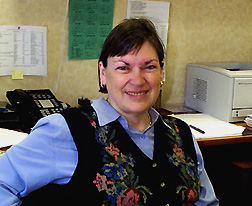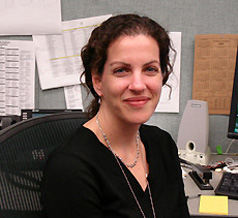

| T H E N I H C A T A L Y S T | N O V E M B E R – D E C E M B E R 2006 |
|
|
|
ETHICS FORUMSigma
Xi National Postdoc Meeting 2006
|
 |
|
Joan
P. Schwartz, assistant director, OIR
|
 |
|
Rebecca
Lipsitz, former NHLBI postdoc and current AAAS fellow in the NIH Roadmap
Office
|
Want to help your postdoctoral fellows become even more productive?
We got some good tips on how to do that at a recent meeting sponsored by Sigma Xi (the international Scientific Research Society) and the National Postdoc Association. The meeting drew faculty, postdocs, and administrators from around the country.
If you’ve spoken with your postdoc or faculty colleagues outside NIH, you know that the postdoc training experience varies greatly among institutions. Until recently, most institutions had relatively few stated policies or explicit expectations regarding postdoctoral training. Although some may argue that the flexible nature of postdoc training is the key to intellectual growth, institutions are starting to recognize the advantages of formalizing certain aspects.
Major topics of discussion at the meeting included 1) the desirability of establishing offices on campus dedicated to postdoc professional development and 2) the results of a national postdoc survey to determine the effects of various services and programs on the quality of the postdoc experience.
Creating Dedicated Postdoc Offices
Over the past few years, faculty, granting agencies, and postdocs themselves, including the National Postdoc Association, have recommended five specific practices to enhance the postdoctoral experience:
![]() Funding through individual fellowships
Funding through individual fellowships
![]() Increased stipends
Increased stipends
![]() Provision of basic benefits, such as health insurance and retirement benefits
Provision of basic benefits, such as health insurance and retirement benefits
![]() Opportunities for professional development
Opportunities for professional development
![]() Structured oversight
Structured oversight
The establishment of postdoc offices was seen as an important way to accomplish these objectives.
NIH offers two levels of postdoc offices:
![]() The centralized OIR Office of Intramural
Training and Education (OITE) provides a series of NIH-wide career development
and other training opportunities for all levels of trainee from high school
to postdoctoral.
The centralized OIR Office of Intramural
Training and Education (OITE) provides a series of NIH-wide career development
and other training opportunities for all levels of trainee from high school
to postdoctoral.
![]() Fellowship training offices within the individual institutes and centers offer
additional IC-specific or science-specific training avenues.
Fellowship training offices within the individual institutes and centers offer
additional IC-specific or science-specific training avenues.
Indeed, the past 10 years have seen a steady growth in these latter offices, to the point that almost every IC with an intramural program also has such an office or, at the very least, a designated training director. These offices have enhanced the training and career development aspects of the Intramural Research Program enormously.
From the Source: Postdoc Survey Results
Sigma Xi’s Geoff Davis, who served as the conference host, presented the results of the recent national Sigma Xi survey. The results are described in detail in "Improving the Postdoctoral Experience: An Empirical Approach" by Davis and can be found at this website.
The survey was sent to 22,400 postdocs, comprising about 40 percent of the total postdoc population in the United States. The fellows work at 47 different institutions, including NIH. The response rate was 38 percent, and statistical analyses showed no non-response biases.
The survey was designed to determine the extent to which each of the five recommended practices previously cited affects the quality of postdoc experiences and productivity.
Four outcome measures were used: subjective success (respondents’ take on their current position), advisor relations, absence of conflict and misconduct, and productivity.
Notwithstanding the observation that postdocs are established professionals with personal responsibility for their own success, survey results supported the added benefit in many outcome measures, including productivity, brought by the provision of structured oversight and professional development opportunities.
Structured oversight includes
![]() Offering letters that detail salary, benefits, and length of appointment
Offering letters that detail salary, benefits, and length of appointment
![]() Establishing career development plans at the outset of training
Establishing career development plans at the outset of training
![]() Providing yearly progress reviews
Providing yearly progress reviews
![]() Creating clear institutional policies on authorship, misconduct, grievance procedures,
and intellectual property
Creating clear institutional policies on authorship, misconduct, grievance procedures,
and intellectual property
![]() Providing career counseling and placement services
Providing career counseling and placement services
Between OITE and the IC training offices, NIH provides almost all of these, although it is up to the postdoc and mentor to take advantage of them. Career counseling and job placement are the least formalized—we expect mentors to be actively involved, and we know that the training offices do some counseling, but a more structured program has been identified as a need by our incoming OITE director.
Professional development opportunities include training in
![]() Research ethics
Research ethics
![]() Writing, speaking, and teaching
Writing, speaking, and teaching
![]() Grant writing
Grant writing
![]() Lab and project management
Lab and project management
![]() Job negotiations
Job negotiations
![]() Intellectual property issues
Intellectual property issues
![]() Conflict resolution
Conflict resolution
![]() English language skills
English language skills
as well as the availability of information about nonacademic careers.
Again, NIH offers essentially all of these learning experiences, many free through NIH-wide courses and workshops presented by both OITE and the individual IC offices.
The biggest challenge remains getting our PIs’ support for their fellows to participate in them.
PIs argue that it is time out of the lab, away from the bench and their experiments. But the Sigma Xi survey results suggest that these times away actually enhance productivity.
Indeed, according to survey results, "Postdocs reporting the highest levels of oversight and professional development are more satisfied, give their advisors higher ratings, report fewer conflicts with their advisors, and are more productive than those reporting the lowest levels."
That information struck us as the most useful and relevant to NIH postdocs that we gained from the meeting. And we happily pass it on.
We also note that NIH
already has a pretty good record for postdoc training: For the past several
years, The Scientist has consistently awarded recognition to NIH and
to some of the individual ICs for being among the "Best Places to Work
for Postdocs."
![]()